In 2025, two standout caching plugins dominate the market:
LiteSpeed Cache (LSC) and WP Rocket.
LiteSpeed Cache offers server-level caching and advanced optimization features tailored for websites hosted on LiteSpeed servers.
It’s a favorite among developers who demand granular control and cutting-edge performance.
WP Rocket, on the other hand, is widely acclaimed for its user-friendly interface and effectiveness, making it a go-to option for beginners and intermediate users alike.
This comprehensive guide explores the key features, advantages, and limitations of both plugins. We’ll compare their caching methods, image optimization tools, CDN integrations, pricing, and ease of setup.
By the end of this article, you’ll have a clear understanding of WP Rocket vs LiteSpeed cache comparison, whether you’re prioritizing speed, cost-efficiency, or simplicity.
1. Server-Level Caching
LiteSpeed Cache offers server-level caching, which is faster and more efficient than WP Rocket’s file-based caching. Server-level caching processes data closer to the source, reducing latency and improving page load times. In contrast, WP Rocket relies on file-based caching, which, while effective, cannot match the speed of server-level solutions.
2. Image Optimization
Both LiteSpeed Cache and WP Rocket include robust image optimization tools. WP Rocket offers lazy loading and integration with third-party tools for image compression. LiteSpeed Cache, however, takes it a step further with advanced features like WebP conversion and built-in QUIC.cloud optimization services.
3. RocketCDN vs. QUIC.cloud
When it comes to CDN (Content Delivery Network) integration, WP Rocket’s RocketCDN is easy to use but comes with additional costs. LiteSpeed Cache integrates seamlessly with QUIC.cloud, offering a free tier and advanced features like image optimization and edge delivery, making it a more economical choice.
4. Remove Unused CSS
WP Rocket introduced the ability to remove unused CSS to improve performance scores on tools like Google PageSpeed Insights. LiteSpeed Cache also supports this feature, but with more customization options, giving you finer control over your website’s CSS.
5. Lazy Load HTML Selectors
LiteSpeed Cache allows lazy loading of HTML selectors, enhancing page load times for resource-heavy pages. WP Rocket also provides lazy loading but lacks the advanced customization options found in LiteSpeed Cache.
6. Localize JavaScript Files
Localizing JavaScript files can significantly reduce external requests. LiteSpeed Cache offers an easy-to-use feature for this, giving it an edge over WP Rocket, which requires additional configuration or third-party plugins.
7. Redis + Memcached Object Cache
LiteSpeed Cache includes built-in support for Redis and Memcached object caching, essential for database-heavy websites. WP Rocket does not offer this feature directly, requiring additional plugins for similar functionality.
8. Guest Mode
LiteSpeed Cache’s Guest Mode is a unique feature that preloads pages for guest visitors, ensuring faster initial load times. WP Rocket lacks this functionality, relying instead on preloading cache for logged-out users.
9. ESI (Edge Side Includes)
LiteSpeed Cache’s ESI feature allows you to cache public and private content separately, ideal for dynamic websites like eCommerce stores. WP Rocket does not have a comparable feature, making LiteSpeed Cache a better choice for complex caching requirements.
10. Database Optimization
Both plugins include database optimization tools. WP Rocket offers scheduled cleanups for revisions, drafts, and more. LiteSpeed Cache provides similar features but integrates directly with server-level resources for enhanced performance.
11. Better Control (But Harder Configuration)
While LiteSpeed Cache offers more advanced features and granular control, it comes with a steeper learning curve. WP Rocket, on the other hand, is user-friendly, making it a better choice for beginners.
12. LiteSpeed Cache Is Free
One of the most compelling advantages of LiteSpeed Cache is that it is free to use, provided your hosting provider supports LiteSpeed servers. WP Rocket, while powerful, is a premium plugin with annual fees.
13. LiteSpeed Cache Requires A LiteSpeed Server
A significant limitation of LiteSpeed Cache is its requirement for a LiteSpeed server. This restriction may make WP Rocket a more versatile choice for users on shared or non-LiteSpeed hosting environments.
14. How To Setup LiteSpeed Cache’s Settings
To configure LiteSpeed Cache:
- Install the plugin and activate it.
- Navigate to the plugin’s settings in the WordPress dashboard.
- Configure caching, optimization, and CDN settings according to your needs.
- Test your website’s performance using tools like GTmetrix or PageSpeed Insights.
15. How To Setup WP Rocket’s Settings
To set up WP Rocket:
- Purchase, download, and install the plugin.
- Activate it and access the settings from the WordPress dashboard.
- Enable caching, lazy loading, and minification features.
- Integrate your preferred CDN for maximum performance.
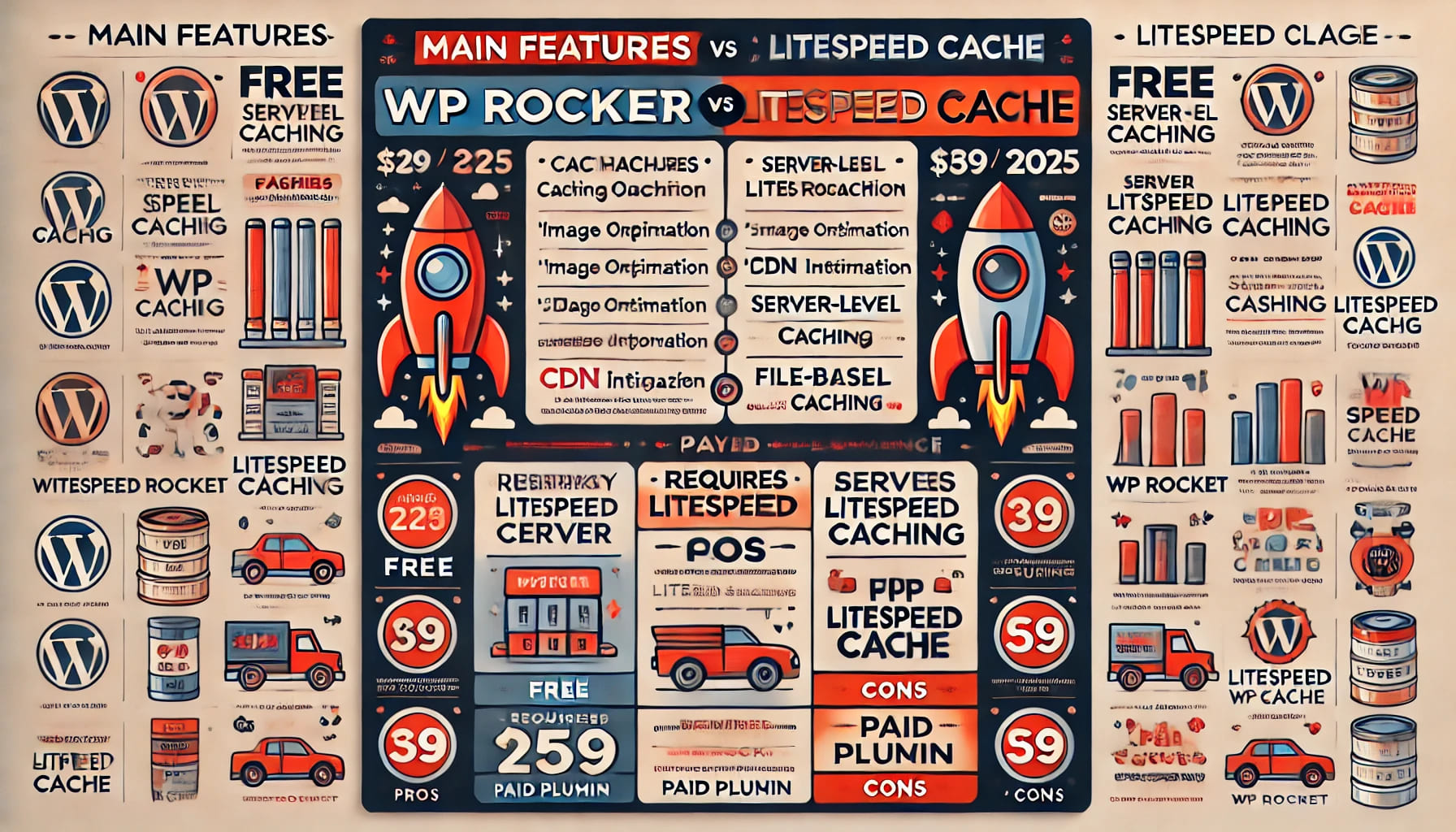
WP Rocket vs LiteSpeed Cache: A Comprehensive Comparison
Understanding WP Rocket
WP Rocket is a premium caching plugin designed to make website optimization simple and effective. Its features include:
Features of WP Rocket
- Caching: Creates static HTML files to reduce server load.
- Minification: Compresses HTML, CSS, and JavaScript files.
- Lazy Loading: Defers loading of images and iframes.
- CDN Integration: Seamlessly integrates with popular CDNs.
- Database Cleanup: Removes unnecessary data to optimize performance.
- Preloading: Generates cached pages automatically.
- GZIP Compression: Reduces the size of transferred files.
- Mobile Optimization: Ensures mobile-first performance.
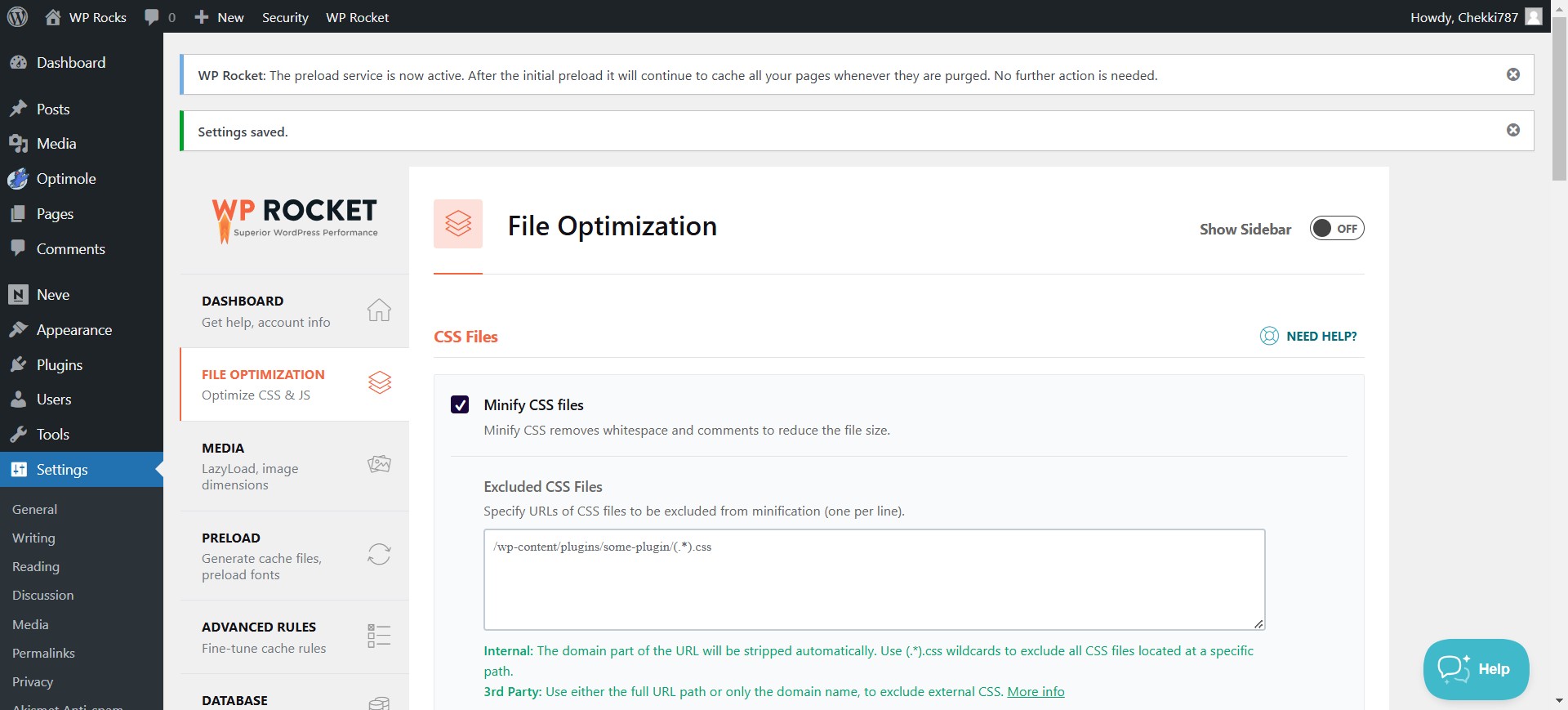
Understanding LiteSpeed Cache
LiteSpeed Cache is a free plugin with advanced server-level features designed for high-performance websites.
Features of LiteSpeed Cache
- Server-Level Caching: Superior caching at the server level.
- Crawler: Preloads pages to keep the cache warm.
- Image Optimization: Includes WebP conversion and QUIC.cloud.
- Object Cache: Supports Redis and Memcached.
- Browser Cache: Stores static files locally for repeated visits.
- CDN Integration: Connects with QUIC.cloud and other CDNs.
- Database Optimization: Similar cleanup tools as WP Rocket.
Benchmarks
Benchmarking WP Rocket
WP Rocket shows consistent performance improvements, reducing page load times by an average of 40-60%. However, results can vary depending on your hosting and website configuration.
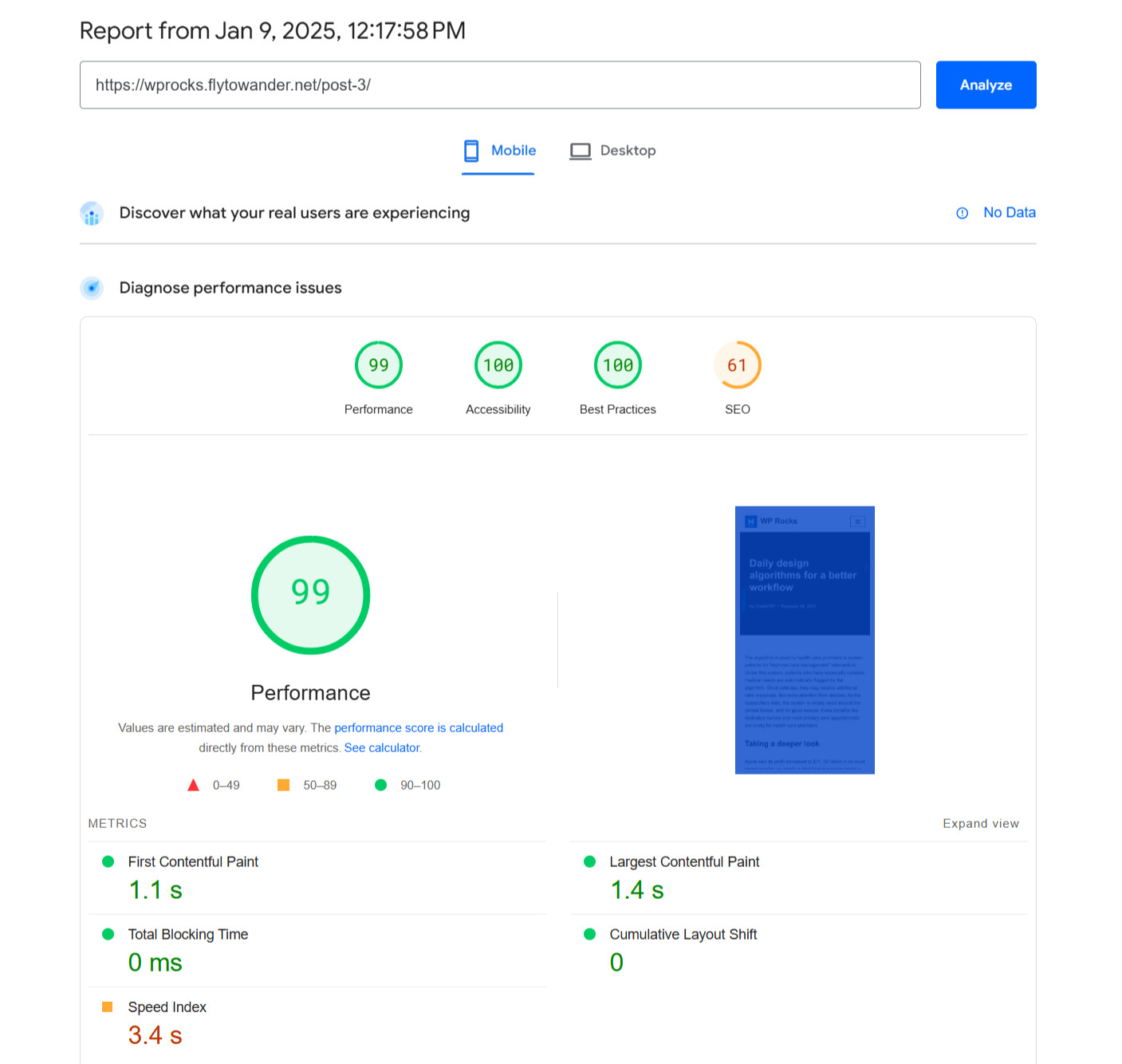
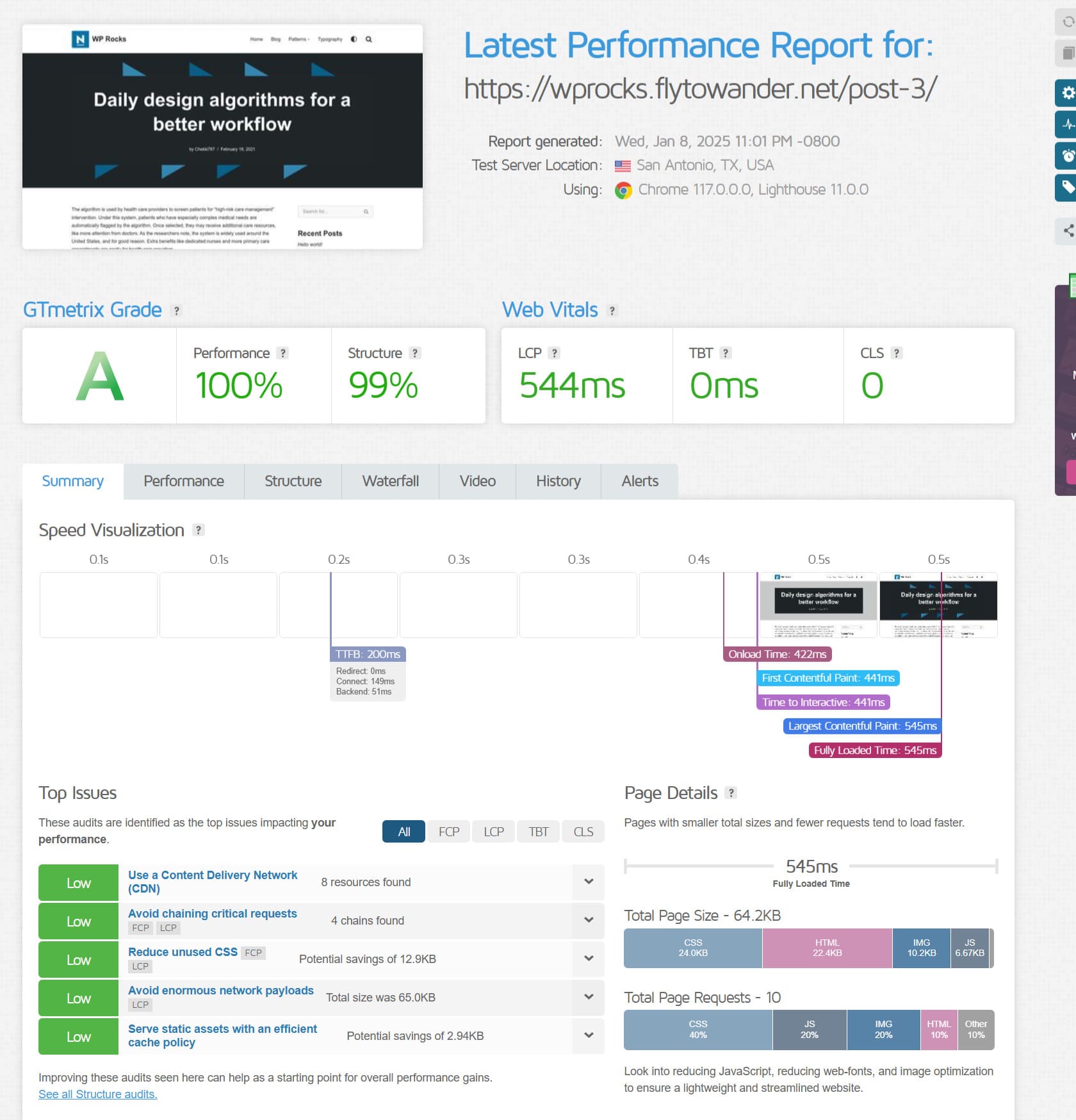
Combined Analysis of GTmetrix and Lighthouse Data:
1. GTmetrix Report Analysis:
- Performance Grade: A (100% Performance, 99% Structure).
- Web Vitals:
- Largest Contentful Paint (LCP): 544ms (Excellent, well below the 2.5s threshold).
- Total Blocking Time (TBT): 0ms (Perfect, no blocking scripts).
- Cumulative Layout Shift (CLS): 0 (Perfect, no layout shifts).
- Page Load Time:
- Fully loaded in 545ms (Exceptional speed).
- Page Details:
- Total Page Size: 64.2KB (Very lightweight).
- CSS: 24KB (40%)
- HTML: 22.4KB (35%)
- Images: 10.2KB (16%)
- JS: 5.6KB (9%)
- Total Requests: 10 (Efficient and low request count).
- Total Page Size: 64.2KB (Very lightweight).
- Key Recommendations:
- Use a Content Delivery Network (CDN): Some resources could benefit from CDN for global delivery.
- Reduce Unused CSS: Potential savings of 12.9KB.
- Avoid Enormous Network Payloads: Identified as 65KB, but already small.
- Optimize Critical Requests: 4 chained requests were identified.
- Static Asset Caching: Improve caching for better repeat visit performance.
2. Google Lighthouse Mobile Report:
- Performance: 99
- Accessibility: 100
- Best Practices: 100
- SEO: 61 (Areas for improvement in SEO).
- Metrics:
- First Contentful Paint (FCP): 1.1s (Good, but room for slight improvement).
- Largest Contentful Paint (LCP): 1.4s (Excellent).
- Speed Index: 3.4s (Moderate; can be optimized).
- Total Blocking Time (TBT): 0ms (Perfect).
- Cumulative Layout Shift (CLS): 0 (Perfect, no layout shifts).
Key Insights:
- Overall Performance:
- GTmetrix and Lighthouse data confirm exceptional performance, with fast load times and excellent Web Vitals.
- Lightweight page size and low request count contribute significantly to high performance.
- Strengths:
- Perfect TBT and CLS in both reports.
- Extremely fast LCP in GTmetrix (544ms) and Lighthouse (1.4s).
- Minimal resource usage and efficient asset management.
- Recommendations for Optimization:
- SEO Improvements: Lighthouse score of 61 suggests issues with metadata, structured data, or mobile friendliness that need addressing.
- CDN Implementation: Use a CDN for resource-heavy assets to further reduce load times globally.
- Reduce Unused CSS: Address flagged CSS savings (12.9KB).
- Optimize Speed Index: Lighthouse’s Speed Index (3.4s) could be reduced by optimizing JS and CSS delivery further.
Conclusion:
The website is highly optimized with excellent speed, minimal resource usage, and near-perfect Web Vitals. While performance is stellar, addressing SEO and flagged low-priority recommendations can further enhance its overall quality and search visibility.
Benchmarking LiteSpeed Cache
LiteSpeed Cache often outperforms WP Rocket in speed tests, particularly on LiteSpeed servers, where server-level caching maximizes efficiency.
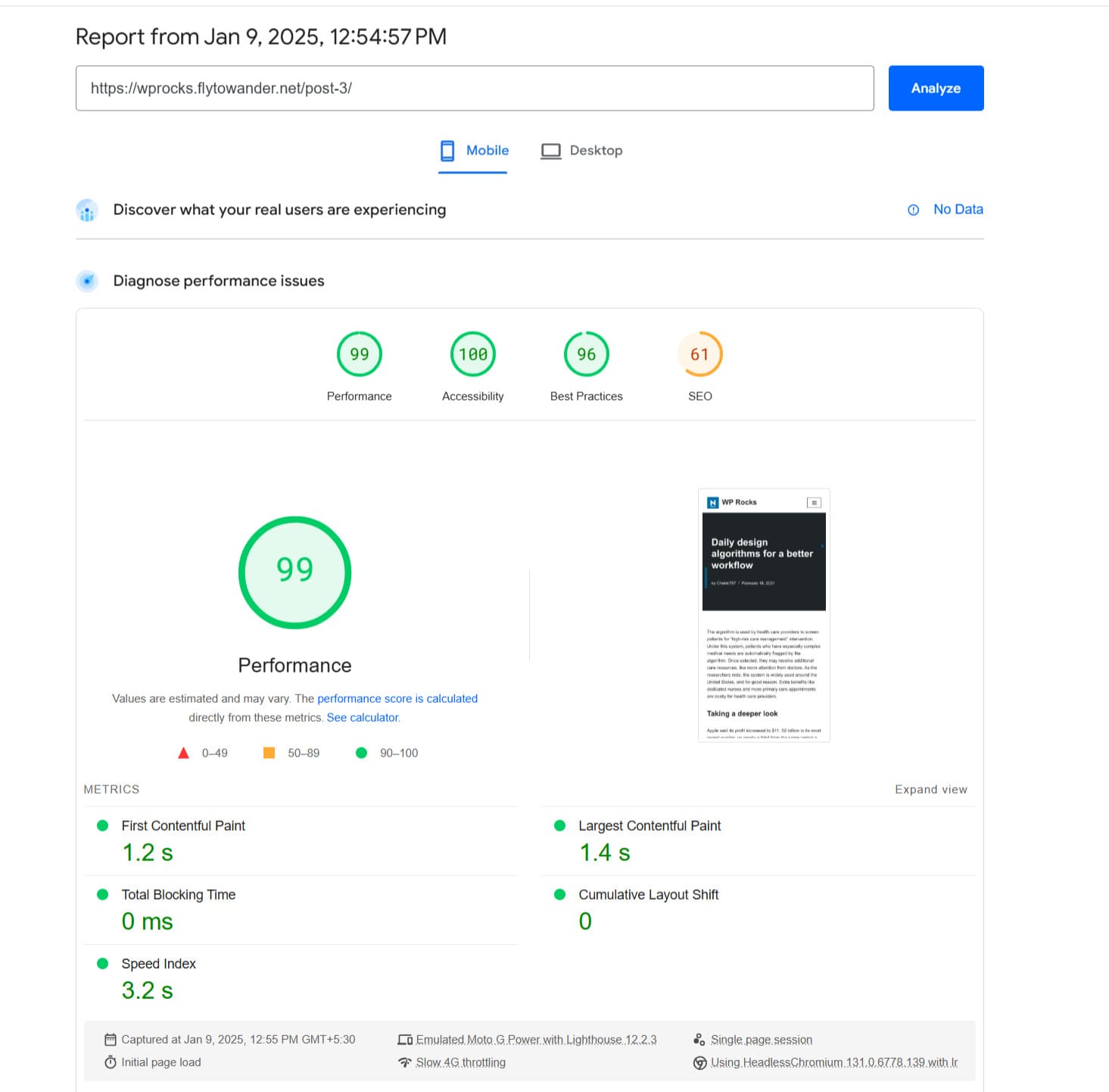
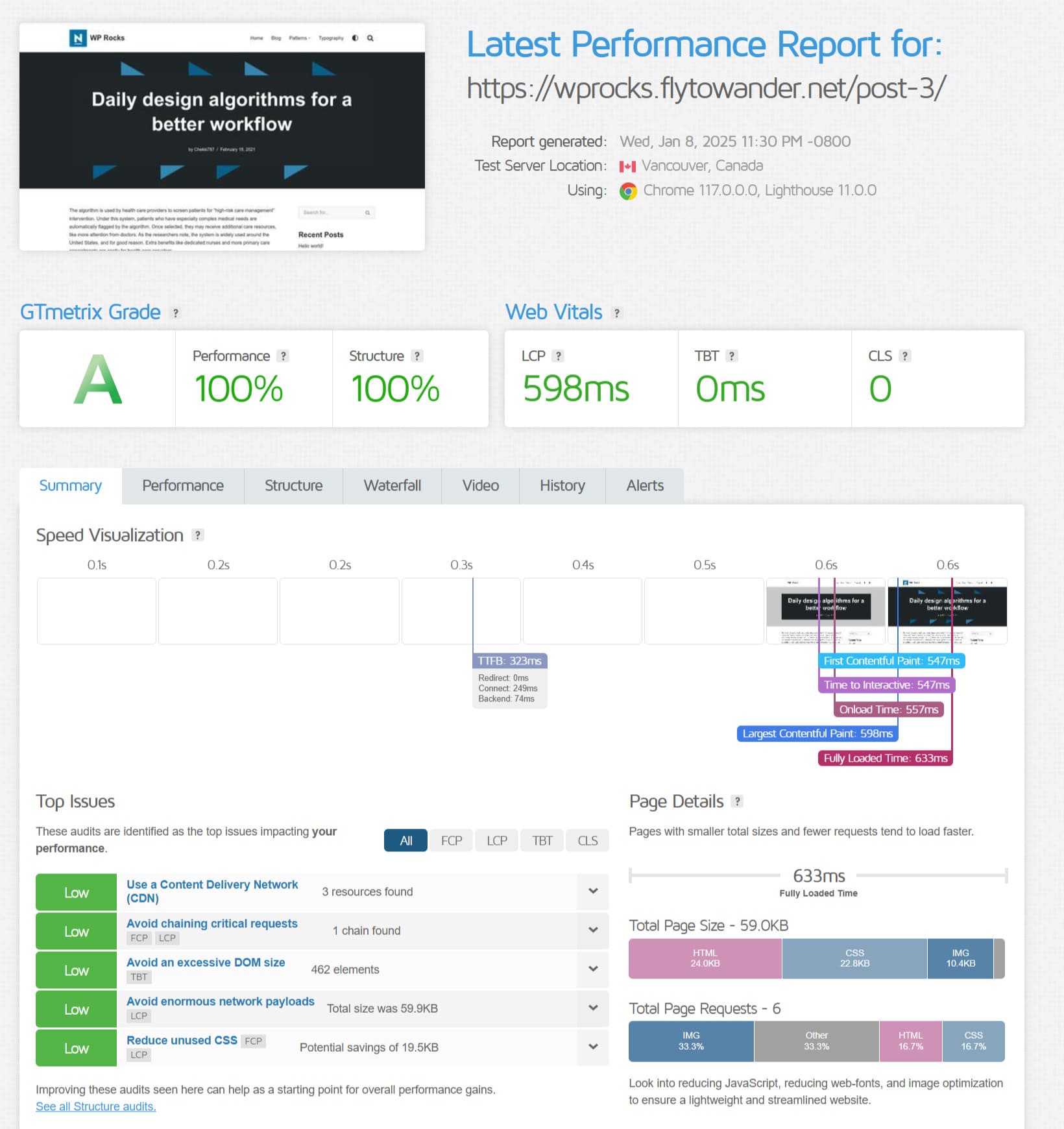
Combined Analysis of Lighthouse and GTmetrix Reports
1. Lighthouse Mobile Report Analysis
- Performance Metrics:
- Performance Score: 99 (Excellent).
- Accessibility: 100 (Perfect usability for diverse users).
- Best Practices: 96 (Minor areas for improvement).
- SEO: 61 (Significant room for improvement in search engine optimization).
- Web Vitals:
- First Contentful Paint (FCP): 1.2s (Good, close to ideal).
- Largest Contentful Paint (LCP): 1.4s (Excellent, within the ideal range of under 2.5s).
- Speed Index: 3.2s (Moderate, could be optimized further).
- Total Blocking Time (TBT): 0ms (Perfect, indicating no blocking JavaScript).
- Cumulative Layout Shift (CLS): 0 (Perfect, no layout instability).
2. GTmetrix Report Analysis
- Performance Metrics:
- GTmetrix Grade: A (100% Performance and Structure scores).
- Web Vitals:
- Largest Contentful Paint (LCP): 598ms (Outstanding, below the recommended threshold).
- Total Blocking Time (TBT): 0ms (Perfect, indicating no delays caused by JavaScript execution).
- Cumulative Layout Shift (CLS): 0 (Perfect, no layout instability).
- Page Load Details:
- Fully loaded in 633ms (Extremely fast).
- Total Page Size: 59KB (Very lightweight, contributing to quick load times).
- HTML: 24KB (40.7%)
- CSS: 22.8KB (38.6%)
- Images: 10.4KB (17.6%)
- Other resources: 1.8KB (3%).
- Total Page Requests: 6 (Extremely efficient and minimal requests).
Key Recommendations from GTmetrix:
- Use a Content Delivery Network (CDN): Suggested for three resources to improve global delivery speeds.
- Avoid Chaining Critical Requests: One chain found that could be optimized.
- Reduce Unused CSS: Identified potential savings of 19.5KB.
- Avoid an Excessive DOM Size: 462 elements flagged, suggesting potential optimization in DOM structure.
- Avoid Enormous Network Payloads: Total flagged size was 59.9KB, which is already minimal but could be refined further.
Combined Insights and Observations:
- Performance Excellence:
- Both tools report stellar performance metrics, with fast page load times, low resource usage, and excellent Web Vitals scores.
- Web Vitals:
- GTmetrix LCP (598ms) and Lighthouse LCP (1.4s) confirm exceptional user experience, well within ideal thresholds.
- TBT is consistently reported as 0ms, ensuring no blocking scripts.
- CLS remains 0 across all tests, indicating stable and well-optimized layout shifts.
- Strengths:
- Minimal page size (~59KB to 64KB).
- Low number of requests (6 to 10), contributing to reduced load times.
- Excellent accessibility and adherence to best practices.
- Recommendations for Further Optimization:
- CDN Implementation: Utilize a CDN for flagged resources to enhance global delivery times.
- Optimize Critical Requests: Address flagged chains for faster rendering.
- Reduce Unused CSS: Minimize unused stylesheets to save bandwidth and improve speed further.
- Streamline DOM Structure: Reduce excessive DOM elements to enhance rendering performance.
- SEO Enhancements: Focus on improving metadata, structured data, and mobile SEO to address Lighthouse’s low SEO score (61).
Conclusion:
Both GTmetrix and Lighthouse reports indicate a highly optimized website with outstanding performance and usability. Addressing the minor flagged areas, particularly SEO, unused CSS, and critical request chains, can elevate the website to perfection.
Comparison: WP Rocket vs LiteSpeed Cache
Pricing
- WP Rocket: Starts at $59/year for a single site.
- LiteSpeed Cache: Free, but requires LiteSpeed server hosting.
FAQs – WP Rocket vs LiteSpeed Cache
What is LiteSpeed Cache known for, and how does it improve website performance?
LiteSpeed Cache is known for server-level caching, which processes requests faster than file-based methods, resulting in improved performance.
How does WP Rocket handle image optimization?
WP Rocket integrates with third-party tools like Imagify for image compression and includes lazy loading.
Which plugin is better for mobile optimization: WP Rocket or LiteSpeed Cache?
Both plugins excel in mobile optimization, but LiteSpeed Cache offers additional features like Guest Mode for faster mobile page loads.
How can I assess the actual impact of these plugins on my website’s performance?
Use tools like Google PageSpeed Insights, GTmetrix, and WebPageTest to compare performance before and after installing each plugin.
What are the key benefits of using WP Rocket for website performance?
WP Rocket’s ease of use, intuitive settings, and comprehensive optimization features make it ideal for beginners.
LSCache vs WP Rocket: Detailed Comparison
Why Picking the Right Cache Plugin Is So Important?
Choosing the right plugin impacts your site’s speed, SEO, and user experience. An optimized caching solution ensures faster page loads, reduced bounce rates, and improved rankings on search engines like Google and Bing.
LSCache vs WP Rocket In Facebook Communities
User reviews often highlight LiteSpeed Cache’s superior performance on LiteSpeed servers and WP Rocket’s simplicity for non-technical users.
LiteSpeed Cache vs WP Rocket Similar Features
Both plugins offer caching, lazy loading, database cleanup, and CDN integration. However, LiteSpeed Cache’s server-level capabilities and advanced features provide a significant edge.
LiteSpeed Cache vs. WP Rocket
Caching
Caching with WP Rocket
WP Rocket uses file-based caching, suitable for most hosting environments.
Caching with LiteSpeed
LiteSpeed Cache’s server-level caching outperforms WP Rocket, offering features like:
- Accurate Purge
- Efficient Cache Cleanup
- Compression
- Cache Varies
Cost
LiteSpeed Cache is free but requires a LiteSpeed server. WP Rocket charges an annual subscription but works on any hosting environment.
eCommerce
LiteSpeed Cache’s ESI feature makes it ideal for WooCommerce and other eCommerce platforms, while WP Rocket lacks dynamic content caching.
Premium Services
LiteSpeed Cache integrates free QUIC.cloud services, while WP Rocket requires additional purchases for similar functionality.
Cache Preloading
Both plugins support cache preloading, but LiteSpeed Cache offers a more robust crawler for this purpose.
In conclusion, both WP Rocket and LiteSpeed Cache are excellent caching solutions. Your choice depends on your hosting environment, budget, and technical expertise. LiteSpeed Cache is ideal for advanced users with LiteSpeed servers, while WP Rocket’s simplicity makes it perfect for beginners or users on shared hosting.
In conclusion, both WP Rocket and LiteSpeed Cache are excellent caching solutions. Your choice depends on your hosting environment, budget, and technical expertise. LiteSpeed Cache is ideal for advanced users with LiteSpeed servers, while WP Rocket’s simplicity makes it perfect for beginners or users on shared hosting.